波士顿咨询集团会用钱来阻止我告诉你们的故事
爱迪生小时愚笨最终成功的故事

爱迪生小时愚笨最终成功的故事托马斯·阿尔瓦·爱迪生(英语:ThomasAlvaEdison,1847年-1931年),美国电工学家、企业家,拥有众多重要的发明专利,被传媒授予“门洛帕克的奇才”称号的他,是历史上第一个利用大量生产原则和工业研究实验室来生产发明专利的人。
以下是店铺分享的爱迪生小时愚笨最终成功的故事,一起来和小编看看吧。
爱迪生小时愚笨最终成功的故事篇(一)爱迪生(1847-1931)是美国人,世界著名的大发明家。
幼年时的爱迪生曾被老师视为“低能儿”,仅仅上了三个月的小学,就被老师责令退学,从此再没跨进过学校大门。
爱迪生完全凭着勤奋自学,闯入了科学发明的天地,即使是在流浪中也不懈地进行发明创造,最终成为了闻名世界的科学巨匠。
爱迪一生共有两千多项发明,为人类做出了巨大贡献,因此被誉为造福人类的“发明大王”、“电气时代的领袖”、“科学界的拿破仑”。
爱迪生小时愚笨最终成功的故事篇(二):人物生平1854年,发生了一件对他的发展有较大影响的事,伊利湖南岸沿着湖铁路通车,使得米兰运河的商船生意大减,爱迪生父亲的生意已经没有办法再维持下去儿时的爱迪生,因为一家生活日渐困苦,为了另谋发展,爱迪生一家就此迁居,他们离开米兰搬到密歇根州休伦港北郊的格拉蒂奥特堡开始新的生活,搬到新居不久,爱迪生就患了猩红热。
[6] 撵出学校1855年,他开始上学,那所学校只有一个班级,校长和老师都是恩格尔先生。
因为爱迪生有刨根问底的天性,在上课时经常经常问老师问题一些另类的问题(如:风是怎么产生的;一加一为什么等于二而不是四),仅仅三个月的时间,就被老师以“低能儿”的名义撵出学校。
[7] 亦师亦母因为母亲南希当时是一家女子学校的教师,是一个富有教育经验的人,她不认为自己的孩子是“低能儿”,因此南希自己教授爱迪生。
据南希平日留心地观察,爱迪生不但不是“低能儿”,而且时常显出才华。
南希经常让爱迪生自己动手做实验,有一次讲到伽利略的“比萨斜塔实验”时,南希让爱迪生到自己家旁边的高塔上尝试,爱迪生拿了两个大小和重量不同的球并同时从高塔上抛下,结果两球同时落地,爱迪生觉得很神奇并兴奋地告诉母亲实验结果,这次实验也铭刻在爱迪生脑海里。
波士顿咨询集团想用钱来阻止我告诉你们的故事来源
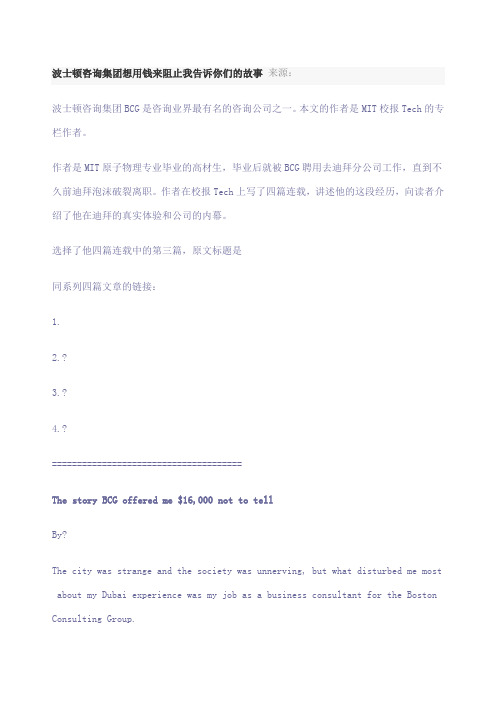
波士顿咨询集团想用钱来阻止我告诉你们的故事来源:波士顿咨询集团BCG是咨询业界最有名的咨询公司之一。
本文的作者是MIT校报Tech的专栏作者。
作者是MIT原子物理专业毕业的高材生,毕业后就被BCG聘用去迪拜分公司工作,直到不久前迪拜泡沫破裂离职。
作者在校报Tech上写了四篇连载,讲述他的这段经历,向读者介绍了他在迪拜的真实体验和公司的内幕。
选择了他四篇连载中的第三篇,原文标题是同系列四篇文章的链接:1.2.?3.?4.?======================================The story BCG offered me $16,000 not to tellBy?The city was strange and the society was unnerving, but what disturbed me most about my Dubai experience was my job as a business consultant for the Boston Consulting Group.I really had no idea what to expect, going in. In my mind, consulting was abou t answering business questions through analysis. It was supposed to be Excel s heets and models, sifting through data to discover profit and loss, and helpin g clients make decisions that would add the most value for themselves, and by extension, society.It was worrisome to enter a new job without any guarantee that I would be qual ified. I assumed BCG would train me, and that as it had been with MIT, intelli gence and hard work would prove sufficient. Still, I wondered what I would do if for some reason it turned out that I couldn’t get my head around the analy sis? In hindsight, analytical skills should have been the least of my worries.Stretching realityThe first clue t hat my mental picture of consulting was off came with “traini ng” in Munich. I expected instruction in Excel programming, data analysis, an d business theory. Instead, Munich turned out to be little more than a week lo ng social outing with other recently matriculated consultants and analysts wit hin the BCG’s European branches. We donned name tags, shook hands, and drank often. Classes were fluffy, and mostly consisted of discussion of high-level, almost philosophical topics. I got along well — as both an American and a mem ber of the Dubai office, I was doubly foreign and therefore double the curiosi ty.After a pleasant week of pseudo-partying, I returned to Dubai and was assigned to writing case proposals. In the consulting business, it is standard practic e for clients to write requests for proposals, describing the question they wo uld like answered. The consulting firm in turn writes a case proposal: We will answer A by having Consultant B do X, Y, and Z. A well written case proposal promises much, but is deliberately vague about what concrete things the consul tants will produce.Case proposals were despised by the rank and file — one had a dozen bosses, u nclear objectives, and virtually no coordination with co-workers. But in one s ense, the proposals were good practice for real case work. Both involved stret ching reality to fit whatever was assumed the client desired.Despite having no work or research experience outside of MIT, I was regularly advertised to clients as an expert with seemingly years of topical experience relevant to the case. We were so good at rephrasing our credentials that even I was surprised to find in each of my cases, even my very first case, that I w as the most senior consultant on the team.I quickly found out why so little had been invested in developing my Excel-cra ft. Analytical skills were overrated, for the simple reason that clients usual ly didn’t know why they had hired us. They sent us vague requests for proposa l, we returned vague case proposals, and by the time we were hired, no one was the wiser as to why exactly we were there.I got the feeling that our clients were simply trying to mimic successful busi nesses, and that as consultants, our earnings came from having the luck of bei ng included in an elaborate cargo-cult ritual. In any case it fell to us to de cide for ourselves what question we had been hired to answer, and as a matter of convenience, we elected to answer questions that we had already answered in the course of previous cases — no sense in doing new work when old work will do. The toolkit I brought with me from MIT was absolute overkill in this envi ronment. Most of my day was spent thinking up and writing PowerPoint slides. S ometimes, I didn’t even need to write them — we had a service in India that could put together pretty good copy if you provided them with a sketch and som e instructions.Burning outI worked hard at MIT. I routinely took seven to ten classes per semester and f illed whatever hours were left in the day with part-time jobs and tutoring. It was a fairly stupid way of going about my education, and I missed out on many of the learning opportunities that MIT offers outside of classes. I don’t re commend what I did to anyone. But as stupid as carrying double course loads wa s, it had one advantage: After all the long hours I put into MIT, I believed I was invincible. If MIT couldn’t burn me out, nothing else ever could.It took roughly three months before BCG disproved my “burn-out proof” theory. Putting together PowerPoint slides was easy, the hours were lenient, and the fifth day of every week usually consisting of a leisurely day away from the cl ient site. By all accounts, I should have been coasting through my tasks.What I learned is that burning out isn’t just about work load, it’s about wo rk load being greater than the motivation to do work. It was relatively easy t o drag myself to classes when I thought I was working for my own betterment. I t was hard to sit at a laptop and crank out slides when all I seemed to be acc omplishing was the transfer of wealth from my client to my company.I’m a free marketeer. I believe that voluntary exchange is not just a good me thod of incentivizing people to provide their labor and talents to society, bu t a robust moral system — goods and services represent tangible benefit to pe ople, market prices represent the true value of goods in society, and wages re present the value that a worker provides to others. Absent negative externalit ies or monopoly effects, a man receives from the free market what he gives to it, his material worth is a running tally of the net benefit that he has provi ded to his fellow man. A high income is not only justified, but there is nobil ity to it.My moral system is organized around a utilitarian principle of greatest good f or the greatest number — that which adds value cannot be wrong. It did not bo ther me therefore when I was handed consulting reports that had been stolen fr om our competitors. If the information in those reports would help us improve our client, then who could say we were doing wrong? Like downloading MP3s, it was a victimless crime.What I could not get my head around was having to force-fit analysis to a conc lusion. In one case, the question I was tasked with solving had a clear and un ambiguous answer: By my estimate, the client’s plan of action had a net present discounted value of negative one billion dollars. Even after accounting for some degree of error in my reckoning, I could still be sure that theirs was a losing proposition. But the client did not want analysis that contradicted th eir own, and my manager told me plainly that it was not our place to question what the client wanted.In theory, it was their money to lose. If they wanted a consulting report that parroted back their pre-determined conclusion, who was I to complain? I did n ot have any right to dictate that their money be spent differently. And yet, t o not speak out was wrong. To destroy a billion dollars is to destroy an almos t unimaginable amount of human well-being. Spent carefully on anti-malarial be d nets and medicine, one billion dollars could save a million lives. This was a crime, and failing to try and stop it would be as bad as committing it mysel f. And if I could not prevent it, then what reason was I being paid such a hig h salary? How could I justify my income if not by prevailing in situations suc h as these?Sit down, shut upEarly on, before I began case work, one manager I befriended gave me some advi ce. To survive, he told me, I needed to remember The Ratio. 50 percent of the job is nodding your head at whatever is being said. 20 percent is honest work and intelligent thinking. The remaining 30 percent is having the courage to sp eak up, but the wisdom to shut up when you are saying something that your mana ger does not want to hear.I spoke up once. And when it became clear that I would be committing career su icide to press on, I shut up.With a diligent enough effort, one can morally justify nearly anything. It was clear that the client was going to go forward with their decision regardless of how I acted. How could I be responsible for a foregone conclusion? And if I had no power to change things, then why shouldn’t I take the course of actio n that lets me keep my job? Who would it benefit for me to give up my paycheck? With my salary, I could make large and regular contributions to Red Cross or Doctors Without Borders — without it I would just be another unemployed bum. But there is a large difference between telling yourself a story and believing it. Ultimately, the core reason I s tayed silent wasn’t altruistic, but selfi sh. At my salary level, and with my expected advancement path, I could comfort ably retire in my thirties. That would mean nearly a full lifetime at my dispo sal, a solid forty years to find true love and raise a family without distract ion. It was the opportunity to travel, to achieve great things, to self-actual ize. It was the prospect of living a life free of want and need. Who was I kid ding? I wasn’t going to donate half my salary to Red Cross. I was going to de posit it into an index fund and speed off as soon as I was sure there was enou gh gas in the car.The conscience is a pesky thing. It was no consolation that I had gotten the m oral calculus to work out in my favor. I should have been the most relaxed man on the planet, and yet every day I went back to my hotel room and spent most of my time nervously pacing. I couldn’t sleep at night. I’d fill up a bathtub and scream into it. I couldn’t get over the feeling that this was not how I was supposed to spend my life.Staying silent was agonizing. Nominally, my job was to provide advice and aid in my client’s decision-making process. In practice, my job consisted of sitt ing quietly and resisting the urge to dissent. Each day was like a punishment from Greek mythology; with every meeting my liver would grow anew to be eaten again by eagles.I was reminded of the Milgram experiment. I wanted to quit. I didn’t want to have any hand in this, I didn’t want the responsibility of being the destroye r. But the man in the lab coat was telling me that the experiment must continu e. Burnout soon followed.It wasn’t just that I lost all motivation for my job; it was also that it is much harder than one would expect to do unsound analysis. There is an interest ing kabuki dance to be done when crafting figures to fit a conclusion. The con clusion may be wrong, but you still need to make it believable. You still need numbers to fill out your PowerPoint slides, and the numbers need to have enou gh internal consistency not to throw up red flags at a casual glance. Honest a nalysis, even when it has weak areas, is easy to defend. If the numbers look f ishy, there’s an explanation —you didn’t have direct data on such and such and had to use estimates from another report, or made a reasonable assumption somewhere. But when the numbers actually are fishy, and there’s no underlying logic to defend, you can’t have any rough areas for others to poke at. And when you know everything is fishy, you can’t tell what will look fishy to someo ne who hasn’t s een any numbers before.This leads to what I like to call, “Find me a rock” problems. The classic “f ind me a rock” story is as follows: A manager goes to his engineer one day an d asks for a rock. “A rock?” asks the engineer. “Yes, a rock. That isn’t g oing to be a problem, is it?” replies the manager. The engineer laughs and te lls the manager he’ll go pick one up during his lunch break and it will be no problem. After lunch, the manager visits the engineer again and the engineer s hows him the rock. The manager looks at it for a moment before telling the eng ineer, “No, that one won’t work at all. I need a?rock.”“Find me a rock” problems sound dead simple, but in actuality have requireme nts that are poorly stated or unknown. You never know what you’re lookin g for; you only know that you’ll know it when you see it.When you disconnect analysis from reality, it would seem like you are freeing yourself up to do your job any way you like. In actuality, you are exchanging one set of clear objectives and rules for another that is complex and ill-defi ned. At one point my manager said to me, “Change the numbers, but don’t chan ge the conclusion.” Of course, there’s no trouble in changing the numbers —it’s not as if there was much of a basis for this set of numbers ov er another — but change them how, and to what? Who knows? Find me a rock.I don’t know if I’ll ever have kids. Still, when I find myself in a moral qu andary, I like to think it through by imagining how I would explain the situation to my future, hypothetical children. What would I say? How would they reac t? Could I justify my actions as having been in their best interest?I wasn’t sure at the time, but having had enough free time of late to ponder such questions, I think I’ve come to the conclusion that h aving a father who can pay for a top-notch education outweighs the disadvantage of being raised b y a hypocrite. Sticking with the job for the sake of a paycheck passes the chi ldren test.I was not surprised the day I lost my job. The writing was on the wa ll. BCG’s management might have been releasing reports claiming countries like Dubai wou ld be islands of stability in the world’s rough financial seas, but to the gr ound troops, it was obvious the economy was not doing well. From the very begi nning of my e mployment, I hadn’t met a single employee who planned on staying with the company — all of them were scrambling for lifeboats, trying to land cushy jobs with cash-stuffed clients or find their way back to their home coun tries.What did surprise me was the offer BCG made to me as I was on the way out the door. In exchange for me signing an agreement, BCG would give me the rough equ ivalent of $16,000 in UAE dirhams. Much of it looked boilerplate, like any com mon compromise agreement used in Europe — in return for some money, I would s tipulate that I hadn’t been discriminated against on the basis of race or gen der, etc.But the rest was very clearly a non-disclosure agreement, and it made me uncom fortable. I signed a non-disclosure agreement when I first took the job, but t hat only covered BCG’s intellectual property and client identities, things th at seemed entirely reasonable to protect. This agreement went much further. No t only did it bar me from making any disparaging comments about BCG or my work experie nce, but I wouldn’t even be allowed to reveal the existence of the no n-disclosure agreement itself. The implication was clear: I could either be a cheerleader for BCG or stay silent, but anything else would bring swift legal retribution. When I asked to have the non-disclosure clauses removed, I was to ld that the agreement was a standard offer to employees, and that its terms we re non-negotiable.As hard as it was to decide whether or not to stay at my job, it was easy to p ass up the hush money. Mistake or not, my future hypothetical children deserve d to hear their father’s story, and $16,000 did not seem like a lot of money in the grand scheme of things. After rejecting the offer, I enjoyed a full nig ht’s rest.源地址:来源:|分享2269|浏览22746|||••2011-02-21 15:44is this true?!2011-02-21 19:38回复尤东辰:我觉得里面那个20%应该就足以成就BCG了,何况他在的是中东,which我们(至少是我)都不了解那里的商业环境和商业理念。
关于感恩节的英语故事
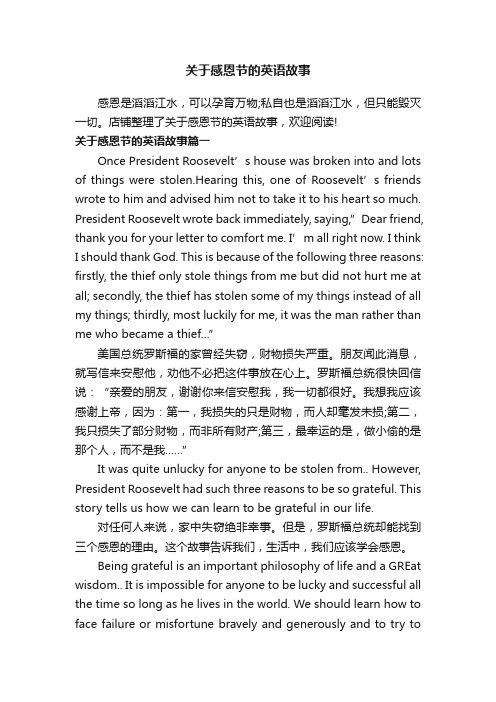
关于感恩节的英语故事感恩是滔滔江水,可以孕育万物;私自也是滔滔江水,但只能毁灭一切。
店铺整理了关于感恩节的英语故事,欢迎阅读!关于感恩节的英语故事篇一Once President Roosevelt’s house was broken into and lots of things were stolen.Hearing this, one of Roosevelt’s friends wrote to him and advised him not to take it to his heart so much. President Roosevelt wrote back immediately, saying,”Dear friend, thank you for your letter to comfort me. I’m all right now. I think I should thank God. This is because of the following three reasons: firstly, the thief only stole things from me but did not hurt me at all; secondly, the thief has stolen some of my things instead of all my things; thirdly, most luckily for me, it was the man rather than me who became a thie f…”美国总统罗斯福的家曾经失窃,财物损失严重。
朋友闻此消息,就写信来安慰他,劝他不必把这件事放在心上。
罗斯福总统很快回信说:“亲爱的朋友,谢谢你来信安慰我,我一切都很好。
我想我应该感谢上帝,因为:第一,我损失的只是财物,而人却毫发未损;第二,我只损失了部分财物,而非所有财产;第三,最幸运的是,做小偷的是那个人,而不是我……”It was quite unlucky for anyone to be stolen from.. However, President Roosevelt had such three reasons to be so grateful. This story tells us how we can learn to be grateful in our life.对任何人来说,家中失窃绝非幸事。
海外华人的励志故事
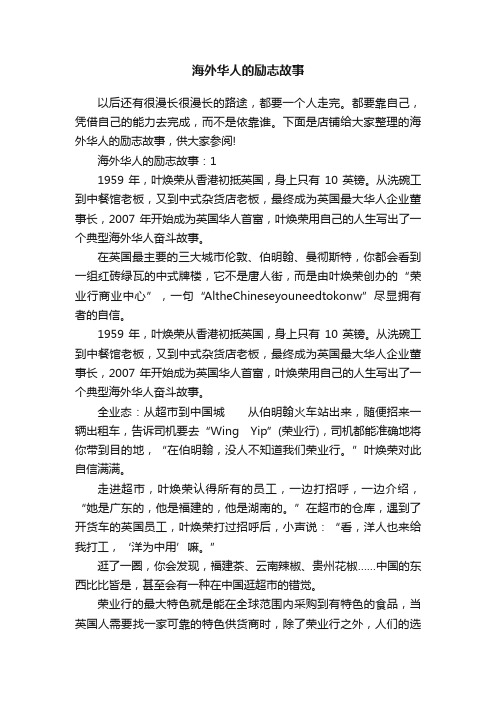
海外华人的励志故事以后还有很漫长很漫长的路途,都要一个人走完。
都要靠自己,凭借自己的能力去完成,而不是依靠谁。
下面是店铺给大家整理的海外华人的励志故事,供大家参阅!海外华人的励志故事:11959年,叶焕荣从香港初抵英国,身上只有10英镑。
从洗碗工到中餐馆老板,又到中式杂货店老板,最终成为英国最大华人企业董事长,2007年开始成为英国华人首富,叶焕荣用自己的人生写出了一个典型海外华人奋斗故事。
在英国最主要的三大城市伦敦、伯明翰、曼彻斯特,你都会看到一组红砖绿瓦的中式牌楼,它不是唐人街,而是由叶焕荣创办的“荣业行商业中心”,一句“AltheChineseyouneedtokonw”尽显拥有者的自信。
1959年,叶焕荣从香港初抵英国,身上只有10英镑。
从洗碗工到中餐馆老板,又到中式杂货店老板,最终成为英国最大华人企业董事长,2007年开始成为英国华人首富,叶焕荣用自己的人生写出了一个典型海外华人奋斗故事。
全业态:从超市到中国城从伯明翰火车站出来,随便招来一辆出租车,告诉司机要去“Wing Yip”(荣业行),司机都能准确地将你带到目的地,“在伯明翰,没人不知道我们荣业行。
”叶焕荣对此自信满满。
走进超市,叶焕荣认得所有的员工,一边打招呼,一边介绍,“她是广东的,他是福建的,他是湖南的。
”在超市的仓库,遇到了开货车的英国员工,叶焕荣打过招呼后,小声说:“看,洋人也来给我打工,‘洋为中用’嘛。
”逛了一圈,你会发现,福建茶、云南辣椒、贵州花椒……中国的东西比比皆是,甚至会有一种在中国逛超市的错觉。
荣业行的最大特色就是能在全球范围内采购到有特色的食品,当英国人需要找一家可靠的特色供货商时,除了荣业行之外,人们的选择实在不多。
荣业行与大多数同类超市还有一大不同之处,即它并不仅仅针对中餐馆。
随着英国人对异国菜肴兴趣的升温,荣业行吸引了越来越多的非华人顾客,这些人不特别计较价钱的高低。
因此,荣业行的净利润便高于其它同类超市。
最新坚强的外国名人故事
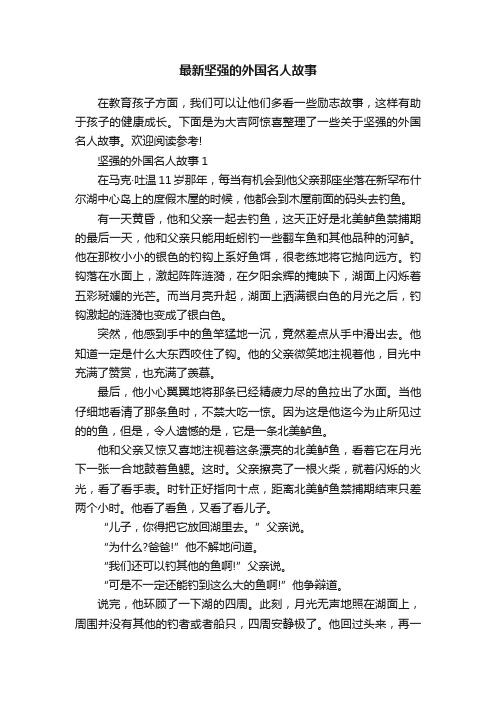
最新坚强的外国名人故事在教育孩子方面,我们可以让他们多看一些励志故事,这样有助于孩子的健康成长。
下面是为大吉阿惊喜整理了一些关于坚强的外国名人故事。
欢迎阅读参考!坚强的外国名人故事1在马克·吐温11岁那年,每当有机会到他父亲那座坐落在新罕布什尔湖中心岛上的度假木屋的时候,他都会到木屋前面的码头去钓鱼。
有一天黄昏,他和父亲一起去钓鱼,这天正好是北美鲈鱼禁捕期的最后一天,他和父亲只能用蚯蚓钓一些翻车鱼和其他品种的河鲈。
他在那枚小小的银色的钓钩上系好鱼饵,很老练地将它抛向远方。
钓钩落在水面上,激起阵阵涟漪,在夕阳余辉的掩映下,湖面上闪烁着五彩斑斓的光芒。
而当月亮升起,湖面上洒满银白色的月光之后,钓钩激起的涟漪也变成了银白色。
突然,他感到手中的鱼竿猛地一沉,竟然差点从手中滑出去。
他知道一定是什么大东西咬住了钩。
他的父亲微笑地注视着他,目光中充满了赞赏,也充满了羡慕。
最后,他小心翼翼地将那条已经精疲力尽的鱼拉出了水面。
当他仔细地看清了那条鱼时,不禁大吃一惊。
因为这是他迄今为止所见过的的鱼,但是,令人遗憾的是,它是一条北美鲈鱼。
他和父亲又惊又喜地注视着这条漂亮的北美鲈鱼,看着它在月光下一张一合地鼓着鱼鳃。
这时。
父亲擦亮了一根火柴,就着闪烁的火光,看了看手表。
时针正好指向十点,距离北美鲈鱼禁捕期结束只差两个小时。
他看了看鱼,又看了看儿子。
“儿子,你得把它放回湖里去。
”父亲说。
“为什么?爸爸!”他不解地问道。
“我们还可以钓其他的鱼啊!”父亲说。
“可是不一定还能钓到这么大的鱼啊!”他争辩道。
说完,他环顾了一下湖的四周。
此刻,月光无声地照在湖面上,周围并没有其他的钓者或者船只,四周安静极了。
他回过头来,再一次望着父亲,目光中充满了恳求,仿佛在说:“既然没有人看到我们,那么就没有人知道我们是什么时候钓到这条鱼的。
”但是,从他父亲刚才那坚决的话语里,他清楚地知道父亲的决定是没有商量的余地的。
于是,他只好慢腾腾地把鱼钩从这条鱼的嘴里取出来,然后,将鱼又放回了漆黑的湖水中。
成年人睡前故事_适合成年人睡前看的小故事

成年人睡前故事_适合成年人睡前看的小故事你知道成年人睡前故事主要有哪些吗?作为一个成年人偶尔看一下睡前故事对我们的生活处事都是有益处的,还有可以从故事中看懂一些哲理,下面是小编给大家整理的成年人睡前故事_适合成年人睡前看的小故事,希望能帮到大家!成年人睡前故事:意外的人选吴有良米店里的人手已经不够了,托人很容易就招了几个打杂的伙计,但是让他犯愁的是城外的一家米店里还差一个掌柜。
他把身边认识的那些有几分才气的人都物色了一遍,但还是没有如意的人选,吴有良急在心头。
生意场上,时间就是金钱。
吴有良打出了招聘告示:月银三十两聘请掌柜一名。
由于不菲的薪金,吸引来了不少的人,就连邻县的几个秀才也赶来了。
吴有良没有想到告示一出,一下子会来这么多人,那就只能优中选优了。
经过几轮的初选、复选后,三十多名报名者中只剩下三位学识渊博的秀才了。
店里只要一个掌柜,这让吴有良又犯愁了。
吴有良当即决定,请最后剩下来的这三个秀才喝酒,感谢他们的支持,顺便给这三个人加试。
其实,就是从这三个人中物色一个最佳人选。
中午时分,秀才们准时来到了吴有良指定的饭店里,本来只有三个秀才加试,却来了四个人。
吴有良透过酒店的后窗向大厅里摆酒宴的桌子望过去,那人面相生疏,并不在加试之列,难道是自己记错了?吴有良纳闷了。
秀才们个个穿着长衫马褂,辫子梳理的油亮,他们都很拘谨,看得出各自都很紧张,静静地等待着吴有良的到来。
菜很快就上齐了,满桌子的山珍海味,让人垂涎欲滴。
一刻钟过去了,有两个人稍稍有了些躁动。
这时,吴有良的二掌柜出现了,告知吴有良有事临时外出了。
说着带头拿起了筷子,请秀才们随意用餐。
只见那个让吴有良面生之人,稳重地站起来,小心翼翼执起酒壶,一一给桌子上的人斟满酒,说着祝福的话。
然后回到自己的位子上,最后再给右手边的张秀才斟酒。
“大家随便点吃,以后我和大家可能就在一个柜台上共事了。
不要客气。
”吴有良的二掌柜说着举起了酒杯。
于是,大家都放开了吃喝。
亿万富豪不会告诉你的10件事
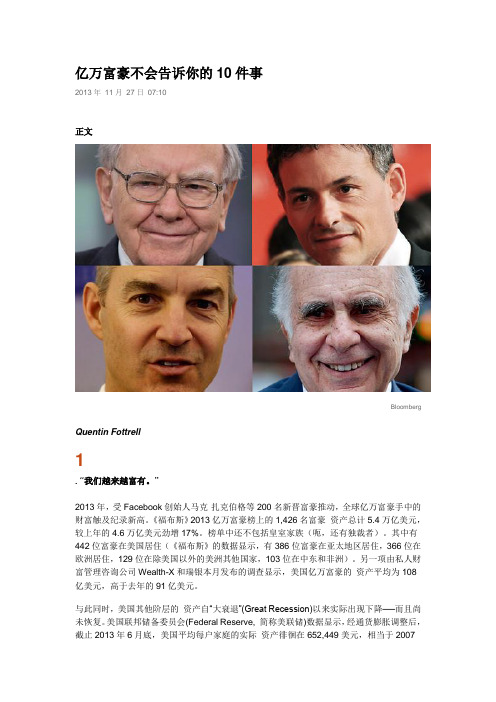
亿万富豪不会告诉你的10件事2013年11月27日07:10正文Bloomberg Quentin Fottrell1. “我们越来越富有。
”2013年,受Facebook创始人马克·扎克伯格等200名新晋富豪推动,全球亿万富豪手中的财富触及纪录新高。
《福布斯》2013亿万富豪榜上的1,426名富豪资产总计5.4万亿美元,较上年的4.6万亿美元劲增17%。
榜单中还不包括皇室家族(呃,还有独裁者)。
其中有442位富豪在美国居住(《福布斯》的数据显示,有386位富豪在亚太地区居住,366位在欧洲居住,129位在除美国以外的美洲其他国家,103位在中东和非洲)。
另一项由私人财富管理咨询公司Wealth-X和瑞银本月发布的调查显示,美国亿万富豪的资产平均为108亿美元,高于去年的91亿美元。
与此同时,美国其他阶层的资产自“大衰退”(Great Recession)以来实际出现下降──而且尚未恢复。
美国联邦储备委员会(Federal Reserve, 简称美联储)数据显示,经通货膨胀调整后,截止2013年6月底,美国平均每户家庭的实际资产徘徊在652,449美元,相当于2007年水平(684,662美元)的95%左右。
如果说该数据看起来特别高,这是因为对大多数美国家庭来说,住房都算是他们的资产。
这一平均值还被百万富翁和亿万富豪拉高了;事实上,皮尤研究中心(Pew Research Center)对美联储2010年调查数据的分析显示,约半数美国家庭的资产不超过83,000美元。
此外,普通美国人的资产自经济衰退以来出现下降,而亿万富豪的资产却较2007年的3.5万亿美元增长了逾50%。
亿万富豪的资产为什么会增加呢?纽约财富管理公司Premier Financial Advisors的财富策略师马克·马蒂亚克(Mark Martiak)表示:“金融市场每日触及纪录新高,使前1%的富裕人群资产激增。
关于青春奋斗的励志故事
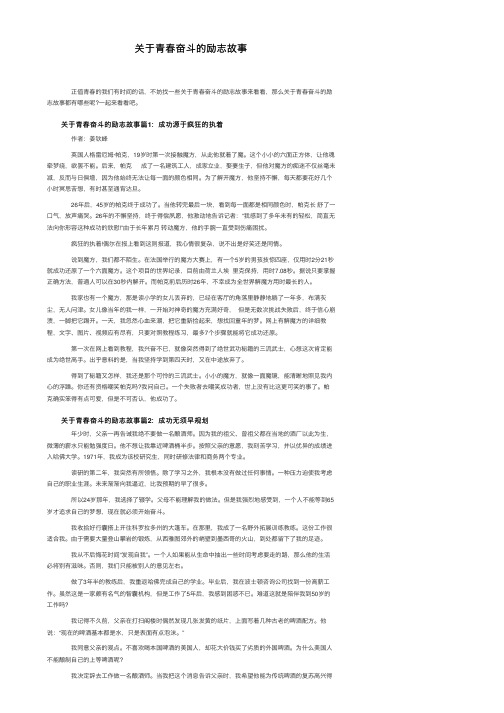
关于青春奋⽃的励志故事 正值青春的我们有时间的话,不妨找⼀些关于青春奋⽃的励志故事来看看,那么关于青春奋⽃的励志故事都有哪些呢?⼀起来看看吧。
关于青春奋⽃的励志故事篇1:成功源于疯狂的执着 作者:姜钦峰 英国⼈格雷厄姆·帕克,19岁时第⼀次接触魔⽅,从此他就着了魔。
这个⼩⼩的六⾯正⽅体,让他魂牵梦绕,欲罢不能。
后来,帕克成了⼀名建筑⼯⼈,成家⽴业,娶妻⽣⼦,但他对魔⽅的痴迷不仅丝毫未减,反⽽与⽇倶增,因为他始终⽆法让每⼀⾯的颜⾊相同。
为了解开魔⽅,他坚持不懈,每天都要花好⼏个⼩时冥思苦想,有时甚⾄通宵达旦。
26年后,45岁的帕克终于成功了。
当他转完最后⼀块,看到每⼀⾯都是相同颜⾊时,帕克长舒了⼀⼝⽓,放声痛哭。
26年的不懈坚持,终于得偿夙愿,他激动地告诉记者:“我感到了多年未有的轻松,简直⽆法向你形容这种成功的欣慰!”由于长年累⽉转动魔⽅,他的⼿腕⼀直受到伤痛困扰。
疯狂的执着!偶尔在报上看到这则报道,我⼼情很复杂,说不出是好笑还是同情。
说到魔⽅,我们都不陌⽣。
在法国举⾏的魔⽅⼤赛上,有⼀个5岁的男孩技惊四座,仅⽤时2分21秒就成功还原了⼀个六⾯魔⽅。
这个项⽬的世界纪录,⽬前由荷兰⼈埃⾥克保持,⽤时7.08秒。
据说只要掌握正确⽅法,普通⼈可以在30秒内解开。
⽽帕克前后历时26年,不幸成为全世界解魔⽅⽤时最长的⼈。
我家也有⼀个魔⽅,那是读⼩学的⼥⼉丢弃的,已经在客厅的⾓落⾥静静地躺了⼀年多,布满灰尘,⽆⼈问津。
⼥⼉像当年的我⼀样,⼀开始对神奇的魔⽅充满好奇,但是⽆数次挑战失败后,终于信⼼崩溃,⼀脚把它踢开。
⼀天,我忽然⼼⾎来潮,把它重新捡起来,想找回童年的梦。
⽹上有解魔⽅的详细教程,⽂字、图⽚、视频应有尽有,只要对照教程练习,最多7个步骤就能将它成功还原。
第⼀次在⽹上看到教程,我兴奋不已,就像突然得到了绝世武功秘籍的三流武⼠,⼼想这次肯定能成为绝世⾼⼿。
出乎意料的是,当我坚持学到第四天时,⼜在中途放弃了。
- 1、下载文档前请自行甄别文档内容的完整性,平台不提供额外的编辑、内容补充、找答案等附加服务。
- 2、"仅部分预览"的文档,不可在线预览部分如存在完整性等问题,可反馈申请退款(可完整预览的文档不适用该条件!)。
- 3、如文档侵犯您的权益,请联系客服反馈,我们会尽快为您处理(人工客服工作时间:9:00-18:30)。
波士顿咨询集团想用钞票来阻止我告诉你们的故事来源:
波士顿咨询集团BCG是咨询业界最有名的咨询公司之一。
本文的作者是MIT校报Tech的专栏作者。
作者是MIT原子物理专业毕业的高材生,毕业后就被BCG聘用去迪拜分公司工作,直到不久前迪拜泡沫破裂离职。
作者在校报T ech上写了四篇连载,讲述他的这段经历,向读者介绍了他在迪拜的真实体验和公司的内幕。
选择了他四篇连载中的第三篇,原文标题是
同系列四篇文章的链接:
1.
2.
3.
4.
======================================
The story BCG offered me $16,000 not to tell
By
The city was strange and the society was unnerving, but what disturbed me most about my Dubai experience was m y job as a business consultant for the Boston Consultin g Group.
I really had no idea what to expect, going in. In my mi nd, consulting was about answering business questions t hrough analysis. It was supposed to be Excel sheets and models, sifting through data to discover profit and lo ss, and helping clients make decisions that would add t
he most value for themselves, and by extension, society.
It was worrisome to enter a new job without any guarant ee that I would be qualified. I assumed BCG would train me, and that as it had been with MIT, intelligence and hard work would prove sufficient. Still, I wondered wh at I would do if for some reason it turned out that I c ouldn’t get my head around the analysis? In hindsight, analytical skills should have been the least of my worr ies.
Stretching reality
The first clue that my mental picture of consulting was off came with “training” in Munich. I expected instr
uction in Excel programming, data analysis, and busines s theory. Instead, Munich turned out to be little more than a week long social outing with other recently matr iculated consultants and analysts within the BCG’s Eur opean branches. We donned name tags, shook hands, and d rank often. Classes were fluffy, and mostly consisted o f discussion of high-level, almost philosophical topics.
I got along well — as both an American and a member o f the Dubai office, I was doubly foreign and therefore double the curiosity.
After a pleasant week of pseudo-partying, I returned to Dubai and was assigned to writing case proposals. In t he consulting business, it is standard practice for cli ents to write requests for proposals, describing the qu estion they would like answered. The consulting firm in turn writes a case proposal: We will answer A by havin g Consultant B do X, Y, and Z. A well written case prop osal promises much, but is deliberately vague about wha t concrete things the consultants will produce.
Case proposals were despised by the rank and file — on e had a dozen bosses, unclear objectives, and virtually no coordination with co-workers. But in one sense, the proposals were good practice for real case work. Both involved stretching reality to fit whatever was assumed the client desired.
Despite having no work or research experience outside o f MIT, I was regularly advertised to clients as an expe rt with seemingly years of topical experience relevant to the case. We were so good at rephrasing our credenti als that even I was surprised to find in each of my cas es, even my very first case, that I was the most senior consultant on the team.
I quickly found out why so little had been invested in developing my Excel-craft. Analytical skills were overr ated, for the simple reason that clients usually didn’t know why they had hired us. They sent us vague request s for proposal, we returned vague case proposals, and b
y the time we were hired, no one was the wiser as to wh y exactly we were there.
I got the feeling that our clients were simply trying t o mimic successful businesses, and that as consultants, our earnings came from having the luck of being includ ed in an elaborate cargo-cult ritual. In any case it fe ll to us to decide for ourselves what question we had b een hired to answer, and as a matter of convenience, we elected to answer questions that we had already answer ed in the course of previous cases — no sense in doing new work when old work will do. The toolkit I brought with me from MIT was absolute overkill in this environm ent. Most of my day was spent thinking up and writing P owerPoint slides. Sometimes, I didn’t even need to wri te them — we had a service in India that could put tog ether pretty good copy if you provided them with a sket ch and some instructions.。
